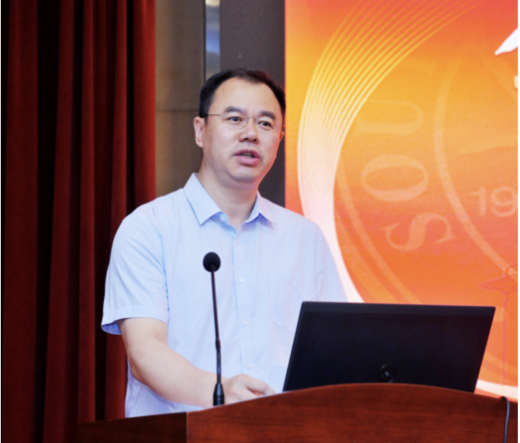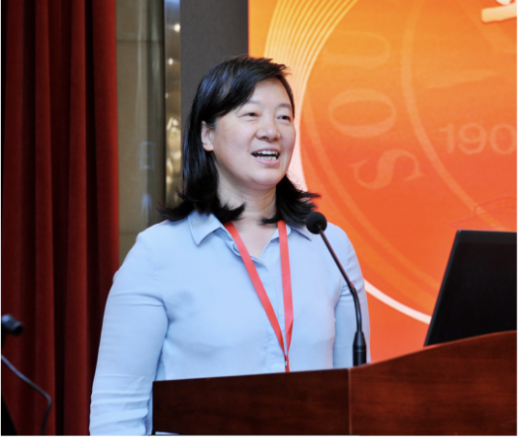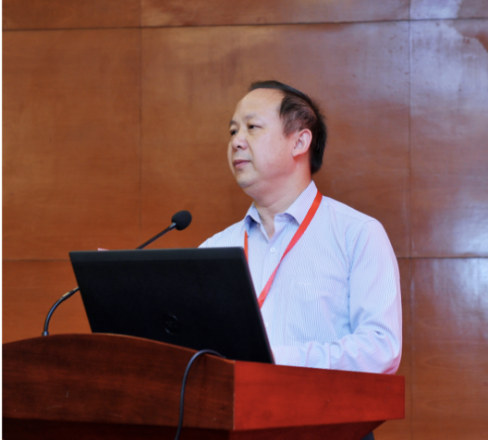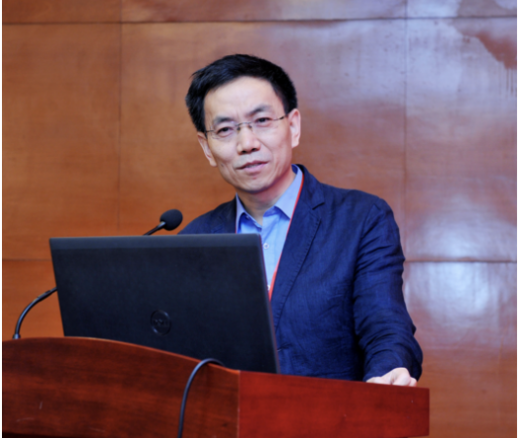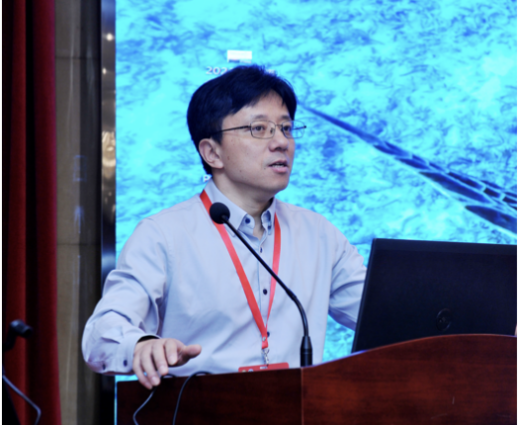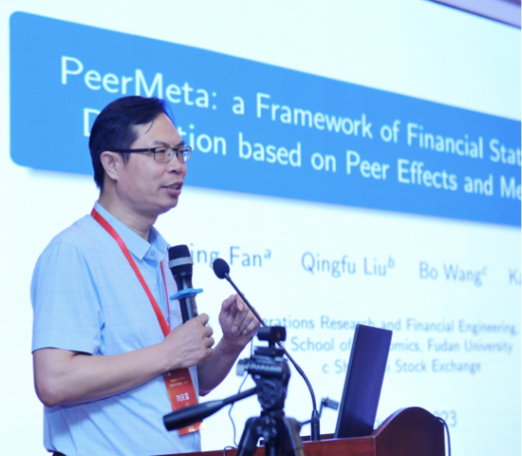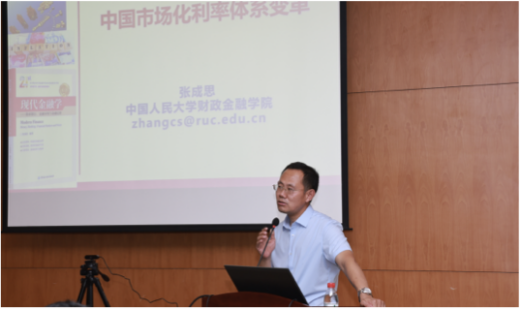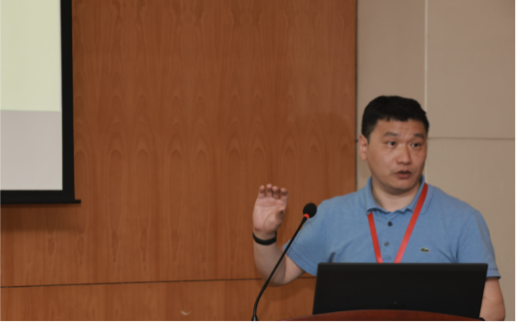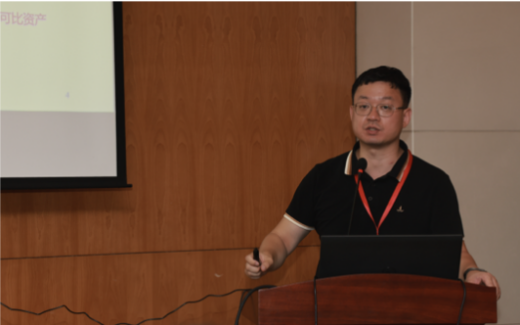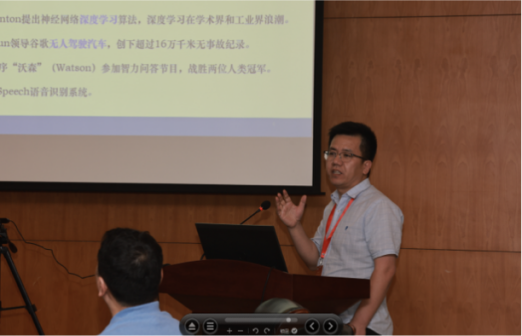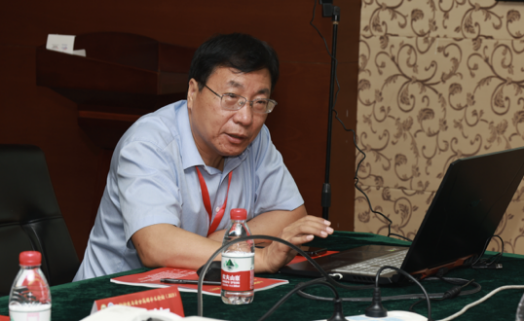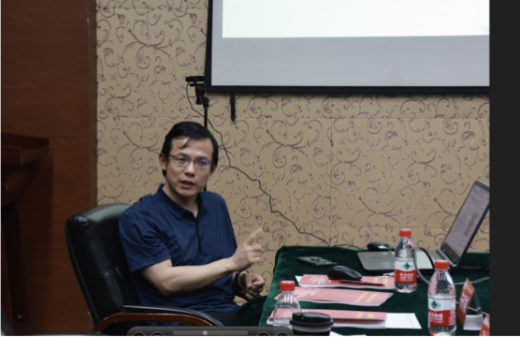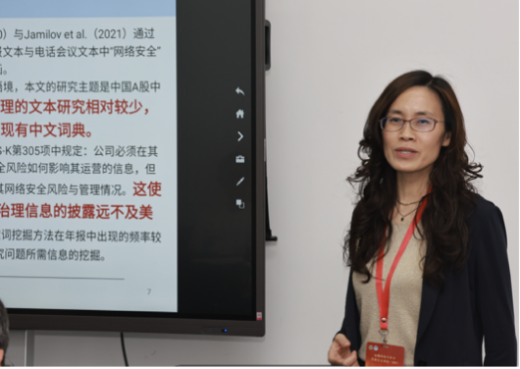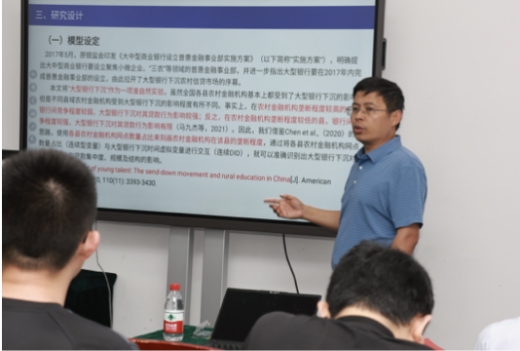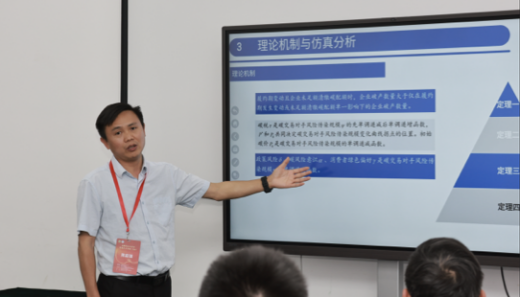On 16-18 June 2023, the "2023 High-End Academic Forum on Financial Technology and Security" was successfully held at Southeast University. The wide application of modern information technology in the financial field and the increasing integration of finance and modern technology are accelerating the change of the traditional financial industry, triggering the deep change of modern finance, and bringing unprecedented opportunities and challenges for the development of financial technology. Leading the innovation of financial science and technology and building an important line of defense for financial security are key issues to further enhance the strength of financial services to the real economy and promote the high-quality development of the economy. In order to further strengthen academic exchanges, gather consensus in the academic community, and provide theoretical research support for the formulation of national policies on financial science and technology and security, the "2023 High-End Academic Forum on Financial Technology and Security" was successfully held on 16-18 June 2023 at Southeast University.
The forum was strongly supported by the Social Sciences Office of Southeast University. The forum was hosted by the School of Economics and Management of Southeast University, organized by the Big Data Laboratory of Financial Security and the Department of Finance of Southeast University, and co-organized by the Jiangsu Economics Graduate Education Steering Committee and the Jiangsu Capital Market Research Association. The forum invited outstanding experts and scholars in related fields from more than 20 famous universities in China, including Tsinghua University, Renmin University of China, Shanghai Jiao Tong University, Fudan University, Zhejiang University, Wuhan University, Tongji University, Xiamen University, Sun Yat-sen University, Shandong University, Hunan University, Beijing Normal University, Central University of Finance and Economics, Shanghai University of Finance and Economics and so on, to discuss the core issues in the field of financial technology and security. The forum covered important topics such as financial technology, financial development, financial security, digital finance, financing for small and medium-sized enterprises, financial innovation and high-quality economic development.
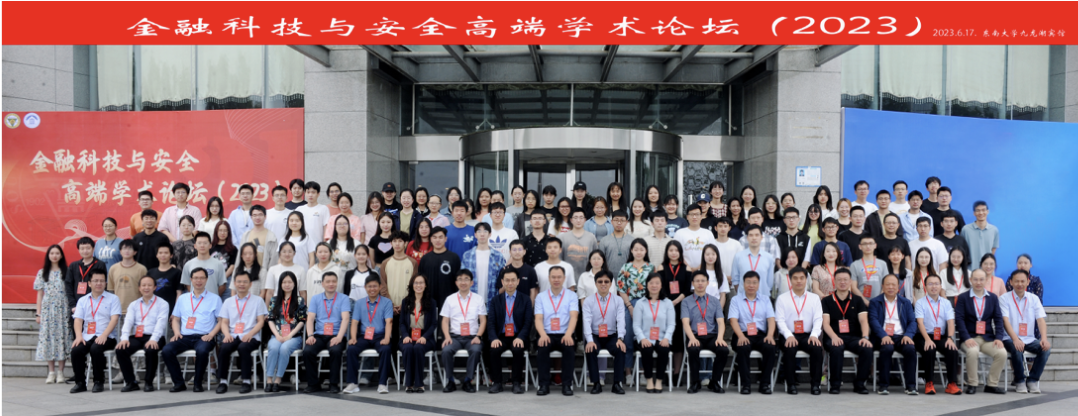
01 Opening Ceremony of the Forum
At the opening ceremony, Professor Sun Litao, Vice President of Southeast University, Professor Gan Feng, Deputy Director of the Social Science Office of Southeast University, and Professor Yuan Jianhong, Secretary of the Party Committee of the School of Economics and Management of Southeast University delivered speeches to extend warm welcome and sincere greetings to all the guests, experts and scholars who had come to the forum. The opening ceremony of the forum was hosted by Professor Liu Xiaoxing, Director of the Finance Department of the School of Economics and Management of Southeast University.
|
|
Prof. Sun Litao, Vice President of Southeast University, delivered a keynote speech | Prof. Gan Feng, Deputy Director of the Social Sciences Office of Southeast University, delivered a keynote speech |
|
|
Prof. Yuan Jianhong, Secretary of the Party Committee of the School of Economics and Management of Southeast University, delivered a keynote speech | Prof. Liu Xiaoxing, Director of Finance Department of School of Economics and Management of Southeast University, delivered a keynote speech |
02 Forum Keynote Speeches
The first half of the keynote speeches of the forum was hosted by Professor Liu Xiaoxing, Director of the Finance Department of the School of Economics and Management of Southeast University. Professor Li Jianjun, member of the Standing Committee of the Party Committee and Vice President of the Central University of Finance and Economics (CUFE), Professor Wang Zhengwei, Deputy Secretary of the Party Committee and Vice President of Wudaokou School of Finance, Tsinghua University, and Professor Dong Xiaojun, Professor of the Department of Economics of the Central Party School (National School of Administration), delivered their keynote speeches respectively. Professor Li Jianjun delivered a keynote speech entitled "Generative AI, Financial Development and Financial Security", in which Professor Li systematically reviewed the development history of generative AI and analyzed its impact on financial development and financial security. Professor Li pointed out that the rapid development of generative AI has brought new challenges to financial security, and it is worthwhile for us to study in-depth how to respond to the development of financial disciplines and talent training. Professor Wang Zhengwei delivered a keynote speech entitled "Fintech Development and Regulatory Implications", in which Professor Wang firstly reviewed the development history of fintech in China, then discussed the logic of its regulation on this basis, and finally looked forward to the future development direction of fintech. Professor Dong Xiaojun delivered a keynote speech titled "New Features of the Evolution of Digital Trade Rules and Response Strategies", in which Professor Dong pointed out that developed economies represented by the United States, Europe and Japan have constructed a complete system of digital trade rules through RTAs, and formed a competitive "digital trade circle". Professor Dong pointed out that the developed economies represented by the US, Europe and Japan have formed a competitive "digital trade circle" by building a complete system of digital trade rules through regional trade agreements. The U.S., Europe and Japan's "circle building" behavior will make China's digital trade rule-making in the "marginalized" state. Whether or not China can increase its right to speak in the formulation of rules for economic governance in the emerging field of digital trade will have a direct impact on the country's economic and financial security.
|
|
Prof. Li Jianjun, member of the Standing Committee of the Party Committee and Vice President of the Central University of Finance and Economics, delivered a keynote speech | Professor Wang Zhengwei, Deputy Secretary of the Party Committee and Vice President of Wudaokou School of Finance of Tsinghua University, delivered a keynote speech |
The second half of the keynote speeches was moderated by Associate Professor Yin Wei, Deputy Secretary of the Party Committee and Associate Dean of the School of Economics and Management, Southeast University. Professor Yi Xingjian, Vice President of Guangdong Finance Institute, Professor Chen Haiqiang, Vice President of Wang Yanan Institute of Economic Research, Xiamen University, and Professor Liu Qingfu, Executive Director of Fudan-Stanford China Institute of Financial Technology and Security, delivered keynote speeches respectively. Professor Yi delivered a keynote speech entitled "Income Risk, Financial Inclusion and Consumption: Empirical Evidence from the CHFS". He reported the latest research results based on the data of the China Household Finance Survey (CHFS), which examined whether financial inclusion can help to alleviate the inhibitory effect of income risk on consumption, and the study found that inclusive finance can significantly alleviate the inhibitory effect of income risk on residents' consumption. Professor Chen Haiqiang delivered a keynote speech entitled "The Mystery of High Fee Rates under the Reform of Securities Marketisation - An Explanation Based on the Unintended Consequences of Quantitative Short Selling". By introducing quantitative short-selling traders who use refinancing to implement an intraday reversal strategy (T+0) into the equilibrium analysis of the refinancing market, this study found that the demand for T+0 strategy borrowing may push up the refinancing rate and crowd out the securities refinancing rate. The emergence of traditional short sellers based on negative information has harmed market efficiency and reduced the willingness of long-term investors to hold shares. Professor Liu Qingfu delivered a keynote speech entitled "PeerMeta: A Framework of Financial Statement Fraud Detection Based on Peer Effects and Meta-Learning". This study constructs a new measure of undisclosed financial services fraud based on media reports that show more timely trend changes and more negative correlations with regulatory intensity than existing measures. Financial services fraud can therefore be reflected more effectively.
|
|
Professor Yi Xingjian, Vice President of Guangdong Finance Institute, delivered a keynote speech | Professor Chen Haiqiang, Vice President of Wang Yanan Institute of Economic Research of Xiamen University, delivered a keynote speech |
| |
Professor Liu Qingfu, Executive Director of Fudan-Stanford China Institute of Financial Technology and Security, delivered a keynote speech | |
03 Sub-Forum I
Sub-forum I of the forum was chaired by Associate Professor Yin Wei, Deputy Secretary of the Party Committee and Vice Dean of the School of Economics and Management, Southeast University. Professor Zhang Chengsi, Vice Dean of the School of Finance and Economics, Renmin University of China, Professor Cheng Lian, Director of the Comprehensive Research Department of the Institute of Finance, Chinese Academy of Social Sciences, Professor Zeng Yan of Lingnan College, Sun Yat-sen University, Professor Wu Wenfeng, Director of the Division of Liberal Arts, Shanghai Jiaotong University, Professor Li Bin, Director of the Department of Finance of School of Economics and Management, Wuhan University, and Professor Yang Aijun, Vice Dean of the School of Economics and Management, Nanjing Forestry University, gave keynote speeches respectively. Professor Zhang Chengsi's report was entitled "The Revolution of China's Market-based Interest Rate Regulation System", in which Professor Zhang analyzed the relative adequacy of China's banking system's reserves, and put forward a path for the revolution of China's market-based interest rate regulation system based on the dynamic evolution trend of the relevant indexes and the foundation of China's central bank's previous practice. Professor Cheng Lian's report was entitled "Systemic Risk Implications of Fintech and Financial Supervision in the New Era", in which he analyzed the potential risks of Fintech from the three dimensions of pro-cyclicality, systemic vulnerability, and external shocks, and discussed the challenges faced by the traditional regulatory system in preventing and controlling systemic risks related to Fintech, and then put forward policy recommendations on this basis. Professor Zeng Yan's report was entitled "The Impact of Internet Co-Lending on Bank Credit Market - Based on the Perspective of Co-operation Mechanism", Professor Zeng pointed out that the co-operation mechanism of co-lending will make the Internet financial institutions more inclined to issue loans to the borrowers with high interest rate but low probability of performance, while the traditional commercial banks' independent risk management and control can reduce the risk of the co-lending credit market and increase the scale of the co-lending credit market effectively. Professor Wu Wenfeng's presentation was entitled "New Regulation on Asset Management, Risk Sharing and Financing of Private Enterprises". Based on the perspective of risk sharing, Professor Wu found that the bond financing of private enterprises decreased significantly after the new regulation on asset management and this decrease is not caused by the reduction of financing demand of private enterprises. Professor Li Bin's presentation was on "Machine Learning-Based Relative Valuation of Chinese Stocks", in which Prof. Li pointed out that machine learning methods can more accurately predict the valuation ratios of firms, and the corresponding mispricing indicators can significantly predict the future returns of stocks. Professor Yang Aijun's presentation was entitled "Progress of Deep Learning Models and Their Applications in Finance", in which Professor Yang reviewed the applications of deep learning models in finance and analyzed the effect of the constructed GARCH-SRU model in volatility prediction through examples.
|
|
Professor Zhang Chengsi, Vice Dean of the School of Finance and Economics of Renmin University of China, delivered a keynote speech | Professor Cheng Lian, Director of the Comprehensive Research Department of the Institute of Finance of the Chinese Academy of Social Sciences, delivered a keynote speech |
|
|
Professor Zeng Yan of Lingnan College, Sun Yat-sen University, delivered a keynote speech | Professor Li Bin, Dean of the Finance Department of the School of Economics and Management, Wuhan University, delivered a keynote speech |
| |
Professor Yang Aijun, Vice Dean of the School of Economics and Management, Nanjing Forestry University, delivered a keynote speech | |
04 Sub-Forum II
Sub-forum II of the forum was chaired by Associate Professor Zhang Ying, Associate Dean of the School of Overseas Education of Southeast University. Professor Yu Minggui, Dean of the School of Finance of Zhongnan University of Economics and Law, Professor Hu Haifeng, Dean of the Finance Department, School of Economics and Business Administration of Beijing Normal University, Professor Zhong Ninghua, Associate Dean of the School of Economics and Management of Tongji University, Professor Cao Tingqiu, Director of the Banking Governance Research Centre, Shandong University, Professor Liu Liya, Assistant to the President of the University of Shanghai for Economics and Business and Secretary of the Party Committee of the School of Finance, and Professor Wang Yizhong, Associate Dean of the School of Economics of Zhejiang University, conducted a keynote reports respectively. Professor Yu Minggui's presentation was entitled "Digital Government Building Enables High-Quality Economic Development - Evidence from the Establishment of SME Financing Service Platforms of Local Governments", in which Professor Yu pointed out that the construction of such service platforms by digital governments has significantly increased the level of bank loans for SMEs. Professor Hu Haifeng's presentation was entitled "Progress, Achievements and Experiences in Preventing and Resolving Financial Risks in China in the New Era", in which Professor Hu pointed out that doing a good job in preventing and resolving financial risks in a comprehensive manner is a major task to safeguard the national economic interests and the long-term interests of the people, which has great practical significance in promoting the high-quality development of China's economy and constructing a new development pattern. Professor Zhong Ninghuai's report was entitled "Transportation Infrastructure Utilization Efficiency and Local Debt Risk". By quantifying the impact on toll road investment and debt servicing risk on the change by its utilization efficiency, Professor Zhong found that the expansion of toll road investment during 2013-2019 reduced the average passenger and freight density of the road network, which significantly increased the debt servicing risk of toll road projects. Professor Cao Tingqiu's report was entitled "Theoretical Connotation and Strengthening Path of Financial Stability Guarantee System", which was discussed by the participants. Professor Cao pointed out that put forward by the 20th National Congress, strengthening the financial stability guarantee system is one of the important contents of the financial development and reform in the new era. Understanding the connotation, grasping the core, and clarifying the strengthening path are key measures to fulfill the spirit of the 20th National Congress. Prof Liu Liya's report was entitled "The Impact and Implications of Bankruptcy in Silicon Valley", Prof. Liu shared her latest research and thoughts on the impact and implications of bank bankruptcy in Silicon Valley this year. Professor Wang Yizhong's report was entitled "How Digital Finance Helps Reduce the Income Gap". Professor Wang pointed out that the development of digital finance has created employment and income for farmers and peasants, and effectively narrowed the urban-rural income gap and the regional income gap. He claimed that alleviating liquidity constraints and empowering whole-chain finance are the main mechanisms of digital finance in narrowing the urban-rural income gap.
|
|
Professor Yu Minggui, Dean of the School of Finance of Zhongnan University of Economics and Law, delivered a keynote speech | Professor Hu Haifeng, Dean of the Finance Department, School of Economics and Business Administration of Beijing Normal University, delivered a keynote speech |
| |
Professor Zhong Ninghua, Associate Dean of the School of Economics and Management of Tongji University, delivered a keynote speech | |
05 Sub-Forum III
Sub-forum III of the forum was hosted by Professor Li Shouwei, Deputy Director of the Finance Department of the School of Economics and Management of Southeast University. Professor Wang Hui, Secretary of the Party Committee of the School of Finance, Central University of Finance and Economics, Professor Ruan Qingsong, Deputy Secretary of the Party Committee and Vice President of the School of Economics and Management, Tongji University, Professor Wu Weixing, President and Deputy Secretary of the Party Committee of the Capital University of Economics and Business, Professor Wang Xiuhua, Dean of the School of Finance and Statistics, Hunan University, Professor Chen Tingqiang, Deputy Dean of the School of Economics and Management, Nanjing University of Technology, delivered keynote speeches respectively. Professor Wang Hui's report was entitled "Cybersecurity Governance and Stock Price Crash Risk: Evidence Based on Text Analysis of Listed Companies' Annual Reports". Professor Wang analyzed the listed companies' annual reports through deep learning methods, constructed corporate cybersecurity governance indicators, and researched the relationship and mechanism between cybersecurity governance and stock price crash risk. He found that cybersecurity governance can significantly reduce stock price crash risk. Prof. Ruan Qingsong's presentation was entitled "Forecasting Exchange Rate Volatility: Is Economic Policy Uncertainty Better?", Prof. Ruan shared his latest research results on economic policy uncertainty in forecasting exchange rate volatility. Prof. Wu Weixing's presentation was entitled "Trade Costs and Household Indebtedness", he focused on the impact of rising trade costs of Chinese exports to the U.S. on the indebtedness decisions of households in China, and pointed out that rising trade costs have significantly increased the level of household indebtedness mainly by reducing household income, increasing the level of overall prices, and raising the level of risk-taking. Prof. Wang Xiuhua's presentation was entitled "Study on the Dual Effects of the Sinking of Large Banks on the Credit Behavior of Rural Financial Institutions", focusing on the impact of the sinking of large banks on the credit behavior of rural financial institutions. Professor Chen Tingqiang's presentation was entitled "Study on Counterparty Risk Contagion among Enterprises under the Synergy of Carbon Tax and Carbon Trading". Professor Chen analyzed the impact of carbon prices and market panic on carbon counterparty risk contagion, and pointed out that when the compliance period changes and companies fail to pay off their carbon quotas in full, the number of corporate bankruptcies will fluctuate and increase, and carbon trading counterparties have the largest risk contagion scale.
|
|
Professor Wang Hui, Secretary of the Party Committee of the School of Finance, Central University of Finance and Economics, delivered a keynote speech | Professor Ruan Qingsong, Deputy Secretary of the Party Committee and Vice President of the School of Economics and Management, Tongji University, delivered a keynote speech |
|
|
Professor Wang Xiuhua, Dean of the School of Finance and Statistics, Hunan University, delivered a keynote speech | Professor Chen Tingqiang, Deputy Dean of the School of Economics and Management, Nanjing University of Technology, delivered a keynote speech |
During the hosting period of the forum, nearly 200 teachers and students from universities across the country and from Southeast University were attracted to participate in the forum. Participants had active interactions and exchanges with experts and scholars. The successful holding of this forum provides a good communication opportunity for experts and scholars, young teachers and students in the financial field, and promotes experts, scholars, teachers and students in this field to further pay attention to and think about key issues such as financial technology and security. Scholars attending the meeting expressed that they will take this forum as an opportunity to further strengthen exchanges and cooperation in the future, and strive to provide suggestions for building an important defense for our country's financial security and promoting high-quality financial development.
(Contributed by: Department of Finance Correspondent: Wang Panpan)
Translated by: Wang Xuanyu
Reviewed by: Li Zhaoting

